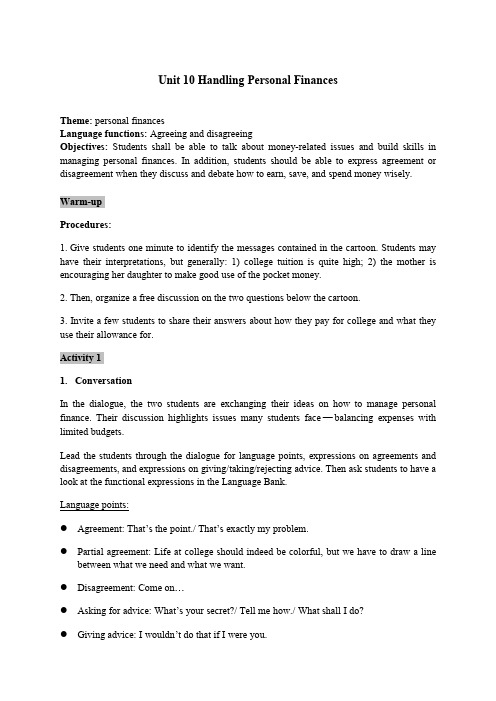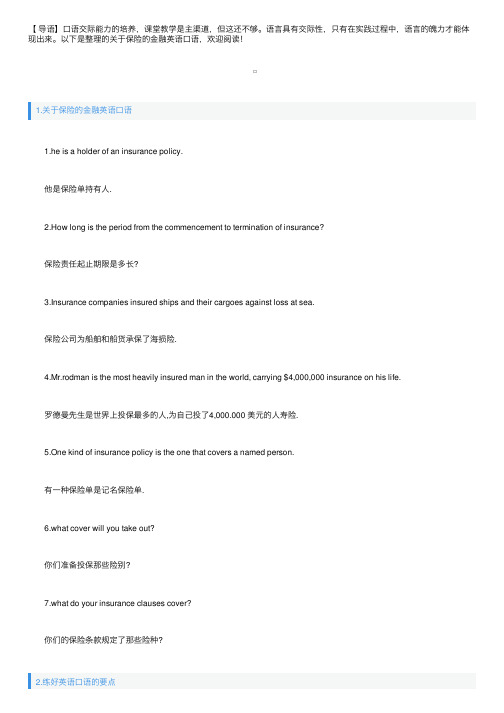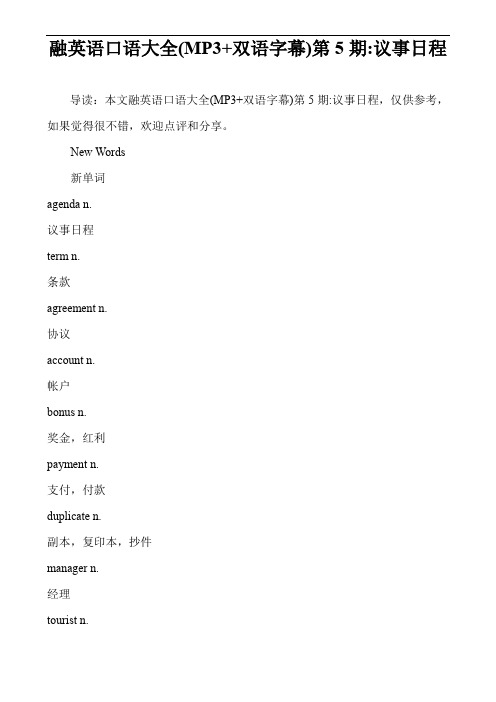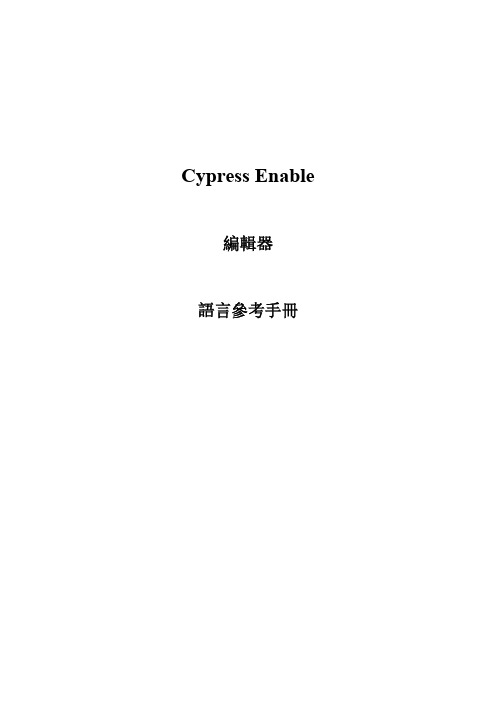金融英语口语大全(MP3+双语字幕)第15期
外研社2024现代大学英语(第三版)口语1教师用书Oral_English_I_Unit_10

Unit10Handling Personal FinancesTheme:personal financesLanguage functions:Agreeing and disagreeingObjectives:Students shall be able to talk about money-related issues and build skills in managing personal finances.In addition,students should be able to express agreement or disagreement when they discuss and debate how to earn,save,and spend money wisely.Warm-upProcedures:1.Give students one minute to identify the messages contained in the cartoon.Students may have their interpretations,but generally:1)college tuition is quite high;2)the mother is encouraging her daughter to make good use of the pocket money.2.Then,organize a free discussion on the two questions below the cartoon.3.Invite a few students to share their answers about how they pay for college and what they use their allowance for.Activity11.ConversationIn the dialogue,the two students are exchanging their ideas on how to manage personal finance.Their discussion highlights issues many students face—balancing expenses with limited budgets.Lead the students through the dialogue for language points,expressions on agreements and disagreements,and expressions on giving/taking/rejecting advice.Then ask students to have a look at the functional expressions in the Language Bank.Language points:●Agreement:That’s the point./That’s exactly my problem.●Partial agreement:Life at college should indeed be colorful,but we have to draw a linebetween what we need and what we want.●Disagreement:Come on…●Asking for advice:What’s your secret?/Tell me how./What shall I do?●Giving advice:I wouldn’t do that if I were you.●Rejecting advice:That never works for me!2.Discussion●Focus:This task is designed to have students reflect on their financial situations andspending habits.Through the discussion,students can gain greater self-awareness of sensible consumption and learn practical strategies from their peers.●Procedures:1.Divide students into small groups of four.Ask them to take turns to share in groups if they can live within their monthly budget and what actions they take when short on money.2.Then discuss in groups what they believe are healthy financial habits for students.Each member should contribute1-2ideas.3.Bring the class back together.Invite a few representatives to summarize their discussions.4.On the board,make a list of healthy financial habits for students based on their discussion. End up by encouraging students to cultivate healthy financial habits.Additional Resources for Teachers:Here are some suggested healthy financial habits for college students:-Make a budget and track spending:Know where your money is going each month and plan based on income and expenses.-Prioritize needs over wants:Spend money on necessities like food,housing,transportation first before entertainment,shopping,etc.-Save a portion of income:Put aside a percentage of any money you receive into savings. Having an emergency fund is important.-Limit eating out:Eating at the university cafeteria is much cheaper than dining out frequently.-Find free or low-cost entertainment:Take advantage of free events,student discounts,and splitting costs with friends.-Look for freebies and deals:Get free samples,use coupons and loyalty programs.-Establish a fun money allowance:Budget a set amount each week for non-essential spending.-Pay with cash:Studies show people spend less with cash.-Avoid impulse purchases:Give yourself time to think through a purchase.-Earn extra income:Get a part-time job or freelance work to supplement your budget.-Live within your means:Don’t try to keep up with others’spending.Focus on needs.3.Pair work●Focus:This task is designed to have students analyze proverbs related to personalfinances in pairs.This exchange allows students to articulate their financial philosophies while being open-minded to other stances.●Procedures:1.Ask students to review the list of money-related proverbs and select the one they most strongly connect with or find insightful.Students can also discuss one that is not on the provided list.2.Divide students into pairs.Explain to students that they will take turns to share their selected proverb and interpretation with their partner.They may agree or disagree with each other,but they should try to use the expressions that have been introduced.3.Then the teacher may ask some volunteers to share their understanding of a particular proverb with the whole class and see if others would agree or disagree with them.●Suggested Answers:Here are some suggested answers:No one is poor unless he thinks himself so.The proverb tries to persuade people never to be beaten by troubles or difficulties in life or lose hope and confidence in winning their fortune.As long as we believe in ourselves and work hard,we can one day realize our dreams and achieve what we want.Be penny-wise and pound-foolish.Don’t focus so much on saving pennies and nickels that you miss out on bigger opportunities. Being overly frugal about small expenses is counterproductive if you waste money in more significant ways.A fool can earn money,but it takes a wise man to save and dispose of it to his advantage. Financial wisdom involves more than just earning money.Knowing how to budget,save,and use money wisely is more beneficial in the long term.Invest for the future.Neither a borrower nor a lender be.Avoid both relying heavily on borrowed money and lending money to others.Too much debt burdens the borrower.Lending money can also strain relationships sometimes.4.Group work●Focus:This task provides an opportunity for students to research the financial situationsof their peers.●Procedures:1.Divide students into groups of four.Explain to students that each group will survey student expenditures.2.Ask students to review the survey template provided.They can add or modify questions as desired.3.Give students sufficient time to conduct the survey and gather results.Suggest a minimum sample size.4.In groups,students calculate and analyze the survey results.5.Each group should prepare a summary of key findings from their survey and the implications for money management.6.Each group will present their survey methodology,results,analysis,and recommendations to the class.7.After presentations,lead a class discussion reflecting on spending habits and budgeting needs revealed from survey outcomes.8.Optional:Have students write an individual reflection on how they might adjust their own finances and spending based on the survey findings.Activity21.ConversationThis dialogue depicts a married couple,Nick and Janet,arguing over their household finances and inability to budget effectively.They are frustrated by their lack of savings and mounting expenses.The conversation reveals issues stemming from their different spending habits, incomes,and attitudes about money management.This dialogue presents an opportunity for students to analyze techniques for successful financial collaboration in relationships.2.Pair work●Focus:This creative task requires students to analyze the core issues in the couple’sdispute over finances and find reasonable compromises that address each one’s concerns.Through this task,students will demonstrate empathy,communication skills,and problem-solving skills as they work to resolve the conflicting approaches to household budgeting.●Procedures:1.Have students work in pairs.Explain to students that they will play the role of Nick and Janet and resolve the couple’s budget dispute.Give students one minute to re-read the dialogue and analyze the issues presented.2.Have students act out their extended conversation.Remind them to reach a reasonable compromise.The dialogue should end with the couple agreeing on a household budget and financial plan. This may involve:-Deciding on overall savings goals-Creating spending categories with assigned amounts-Agreeing on a system for tracking expenses-Compromising on discretionary spending items3.Invite a few volunteers to perform their completed dialogues for the class.4.Lead a short discussion reflecting on the budget solutions presented.Which compromises were most reasonable?What communication tactics worked best?5.Optional:Have students write a short reflection on what they learned about managing finances as a couple.Sample DialogueNick:I still think we need to control our spending.What if we each have an allowance to spend entirely at our discretion?Janet:But we need transparency,not separation.I don’t want to ask you for money when I need it.Nick:You’re right,that doesn’t work.Hmm,what if we have a shared account for bills and household expenses that we both contribute to based on our incomes?Then the rest ispersonal spending money.Janet:That’s better,but it doesn’t address our different attitudes about what’s worth spending on.For example,you think my books are useless.Nick:Okay,true.I suppose I should be less critical about your minor purchases if you could attempt to somewhat reduce your larger expenses.Janet:Fair enough.And we should agree on our savings goals for the year.Let’s aim to save$5000for vacations and$3000for the kids’college.Nick:Alright,it’s a deal.Should we use an app to track where all the money is going each month?That way we can catch any leaks early.Janet:Definitely.Having it all visible will help us make better choices together rather than pointing fingers.As long as we’re open to each other and work as a team,I think we can do this!Nick:Me too.I’m sorry.This is new to us but I’m glad we talked it out.Janet:Apology accepted.Now,ready to go over these credit card statements?Full transparency!Nick:You got it!Let’s do this.3.Role-play●Focus:This role-play task is designed to have students practice managing householdfinances through an improvised dialogue.The goal is to collaboratively track expenses and deposits to gain skills in household money management.●Procedures:1.Have students work in pairs.In each pair,one student should be the“big spender”and the other be the“miser.”2.Explain to students that they will play the role of a married couple who will review the monthly account book together.Remind them to take on the opposing attitudes of their roles.3.Give students a few minutes to review the account book and prepare for the role-play.The big spender should be ready to justify lavish purchases.The miser should express concern over unnecessary spending.4.Invite a few pairs to present their role-plays for the class.Pairs should aim to reconcile their different spending habits and agree on a reasonable budget and financial plan.5.Lead a discussion on the challenges of synchronizing financial viewpoints with a partner and effective strategies to enhance communication.Sample DialogueMiser:Okay,let’s go over these expenses line by line.RMB557at the shopping center?! That seems extremely high.What did you buy?Big Spender:I got some new clothes for work and a nice pair of shoes.Can’t I treat myself every once in a while?Miser:I suppose,but we need to stick to our budget.RMB80for a football ticket also seems excessive when we could watch it at home.Big Spender:It was a special event!I got to see it live with my friends.Miser:Let’s try to limit recreational spending to RMB100a month going forward.Now,the RMB200at the beauty parlor?!What’s that about?Big Spender:A girl’s got to look good!It was for a haircut and highlights.I can’t help it if the salon is pricey.Miser:Maybe try a less expensive place next time.I think we can cut this category in half. As for the RMB120movie—watching at home is way cheaper.Big Spender:Okay,I see your point.I can cut back on some of these extra treats.But could I still get some personal fun money that I don’t need to justify?Miser:That’s fair.How about we each get RMB200in discretionary spending?And we’ll save more by cooking at home and looking for free entertainment.Big Spender:It’s a deal!I want us to reach our savings goals.And I appreciate that you keep us on track.Miser:Thanks for being open to compromise.Together we’ve got this budget thing down! Activity31.How much money does a student need per month?This text discusses appropriate monthly allowances for college students in China.It centers on a university student dissatisfied with her RMB2,000monthly stipend from her parents, which she argues prevents her from indulging in luxuries like her peers.The author counters that this amount should sufficiently cover a student’s needs,citing a survey showing average undergraduate expenses in major cities were under RMB2,000.Experts advise students to adjust consumption based on family income and remember that education is the priority over material comforts.The issue reflects a generation gap in attitudes toward money, consumption values,and life priorities between Chinese youth and their elders.It also highlights the challenges of managing personal finances independently for the first time as a young adult.The text provides broader commentary on the importance of developing healthy spending habits.2.Discussion●Focus:Through this task,students will analyze their financial attitudes and deepen theirunderstanding of responsible money management and consumption habits.●Procedures:Divide students into groups of four and ask them to share their answers to the questions with group members.Remind students that they should have one member take notes of the major points that group members have made.After the group discussion,the note-takers would report their group discussion to the class.3.Role-play●Focus:This role-play scenario aims to provide an interactive way for students tointernalize the text’s themes revolving around fiscal responsibility and independence.Students could also practice agreeing and disagreeing,as well as offering and accepting suggestions through talking about money issues.Procedures:1.Divide students into pairs.In each pair,one student should be Student A and the other be Student B.2.Give students two minutes to read their role cards and get into character.Students should think about how they would act in their assigned role and improvise conversation based on their role descriptions.3.After five minutes of role-playing,the teacher will invite some students to present their role-play to the class.5.To conclude,students share their experiences and discuss what they learned about from this activity,and the teacher will summarize the insights gained.Sample Dialogue:Student A:I can’t believe my parents haven’t bought me a laptop yet.How do they expect me to do my schoolwork without one?It’s ridiculous that they haven’t provided me with this basic necessity for studying.Student B:I’m sorry to hear you don’t have a laptop,but maybe your parents can’t afford one right now.My parents give me a monthly allowance that’s usually enough,but lately, I’ve been donating some of it to charity so I’m short on cash.Student A:Well,if I were you,I’d tell my parents to give me more money.They should be responsible for making sure you have everything you need as a student.Student B:I disagree.I think we need to learn to be independent and make sacrifices sometimes.Your parents probably want you to focus on your studies rather than expensive gadgets.Student A:I guess you have a point.I don’t need the latest laptop.I should be grateful that my parents provide for my basic needs.It’s admirable that you’re donating your own money to help others in need.Student B:Thank you.But now I’m worried about covering my expenses.Do you have any ideas on how I could earn some extra money?Student A:Hmm...you could tutor younger students or get a part-time job on campus.Let me know if you need help!Student B:Those are great suggestions!Thanks for your advice!Supplementary Activity1.Learn to spend sustainablyThe passage offers advice for developing healthy spending habits and avoiding financial issues stemming from overspending.It targets readers who struggle with impulse purchases or have trouble differentiating between wants and needs.2.Discussion●Focus:This discussion aims to have students reflect on their spending habits andevaluate the effectiveness of the tips for avoiding impulsive purchases.●Procedures:1.Explain to students that the goal of this discussion is to reflect on their spending habits and evaluate strategies for controlling impulsive purchases.Encourage students to be open about sharing their experiences.2.Invite a few volunteers to describe a time they made an impulsive e probing questions to understand their motivations.3.After a few students have shared,facilitate a whole-class discussion on the effectiveness of the tips provided in the passage.Ask students to explain their perspectives.4.Invite students who have tried any of the techniques to describe their experiences implementing them.Did the strategies help manage spending?Have each student identify one tip they would be willing to try and explain why they think it would work for them.5.Leave five minutes at the end for students to reflect individually on new insights they have gained about sustainable spending habits.Definition:Impulsive buying,or impulsive spending,is the tendency of a customer to buy goods and services without planning.When a customer makes such buying decisions at the spur of the moment,it is usually triggered by emotions and feelings.Description:Impulsive buying can’t be categorized for one specific product category. Impulsive buying can be seen in products such as chocolates,clothes,and mobile phones and in big-ticket items such as cars,jewelry,etc.Impulsive buying means making an unplanned purchase.It is based on an irrational thinking.Marketers try to tap this behavior of customers to boost sales.There is a great likelihood that customers end up making a purchase ofproducts after entering the hypermarket without any actual intent of doing so.Many mobile phone makers tend to exploit this trait in customers by introducing products that can be add-on gadgets for their mobiles such as fitness bands,etc.。
国际金融英文版第十五版复习资料

前言学弟学妹们,当你们看到这篇复习资料的时候, 学长已经在文档上传的当天上午参加了国际金融的考试, 本复习资料主要针对对象为成都信息工程学院(CUIT)英语系大三学生, 且立足教材也基于托马斯·A ·普格尔(Thomas A. Pugel)先生所著国际金融英文版·第15版, 其他版本或者相似教材也可作为参考, 本资料的整理除了参考维基百科,百度百科以及MBA 智库百科,当然最重要的是我们老师的课件. 为了帮助同学们顺利通过考试, 当然是拿到高分, 希望此资料能够帮助你们节省时间, 达到高效复习的效果.外国语学院2011级,陈爵歌(Louis) 2014年1月6日晚于宿舍 Chapter 2Transnationality Index (跨国化指数)(TNI ) is a means of ranking multinational corporations that is employed by economists and politicians. (反映跨国公司海外经营活动的经济强度,是衡量海外业务在公司整体业务中地位的重要指标) Foreign assets to total assets(外国资产占总资产比)Foreign sales to total sales(海外销售占总销售)Foreign employees to total employees(外籍雇员占总雇员)跨国化指数的构成联合国跨国公司与投资司使用的跨国化指数由三个指标构成:国外资产对公司总资产的百分比;国外销售对公司总销售的百分比;国外雇员人数对公司雇员总人数的百分比关于TNI 的计算公式:International Economic Integration( 国际经济一体化)International economic integration refers to the extent and strength of real -sector and financial -sector linkages among national economies.(国际经济一体化是指两个或两个以上的国家在现有生产力发展水平和国际分工的基础上,由政府间通过协商缔结条约,让渡一定的国家主权,建立两国或多国的经济联盟,从而使经济达到某种程度的结合以提高其在国际经济中的地位)Real Sector(实际经济部门): The sector of the economy engaged in the production and sale of goods and services(指物质的、精神的产品和服务的生产、流通等经济活动。
金融词汇中英对照

常见金融术语英汉对照与详解

�
)本成有持( yrraC-fo-tsoC )数因换转( rotcaF noisrevnoC )算清额净同合( gnitteN lautcartnoC )士瑞所交期洲欧( serutuF FNOC )易交续连( gnidarT suounitnoC )小大约合( eziS tcartnoC
)问顾易交品商( rosivdA gnidarT ytidommoC
�
)扣折( gnitnuocsiD
)�行央国德�行银邦联志意德( knabsednuB ehcstueD
)格价算结日( ecirP tnemeltteS yliaD )算结日每( tnemeltteS yliaD
)金证保通流的前目( nigraM gnitadiuqiL tnerruC )求请叉交( tseuqeR ssorC )型模坦斯宾鲁-斯罗-斯克考( ledoM nietsnibuR-ssoR-xoC )权期购认兑备( llaC derevoC )方手对( ytrapretnuoC )度曲凸( ytixevnoC )换转( noisrevnoC )票息( nopuoC )险避叉交( egdeH ssorC )易交叉交( edarT ssorC
)约合月即( tcartnoC tnorF
)场市部内围范大( tekraM edisnI dednetxE )位仓行执( noitisoP desicrexE )权期行执( noitpO desicrexE )行执( esicrexE )除排( noisulcxE )认确行执( noitamrifnoC noitucexE )格价行执( ecirP desicrexE )期到( noitaripxE
)权期内价( noitpO yenom-eht-nI )码编别识券证际国( rebmuN noitacifitnedI seitiruceS lanoitanretnI )差价品产跨( daerpS tcudorp-retnI )品产间区( tcudorP lavretnI
关于保险的金融英语口语

【导语】⼝语交际能⼒的培养,课堂教学是主渠道,但这还不够。
语⾔具有交际性,只有在实践过程中,语⾔的魄⼒才能体现出来。
以下是整理的关于保险的⾦融英语⼝语,欢迎阅读!1.关于保险的⾦融英语⼝语 1.he is a holder of an insurance policy. 他是保险单持有⼈. 2.How long is the period from the commencement to termination of insurance? 保险责任起⽌期限是多长? 3.Insurance companies insured ships and their cargoes against loss at sea. 保险公司为船舶和船货承保了海损险. 4.Mr.rodman is the most heavily insured man in the world, carrying $4,000,000 insurance on his life. 罗德曼先⽣是世界上投保最多的⼈,为⾃⼰投了4,000.000 美元的⼈寿险. 5.One kind of insurance policy is the one that covers a named person. 有⼀种保险单是记名保险单. 6.what cover will you take out? 你们准备投保那些险别? 7.what do your insurance clauses cover? 你们的保险条款规定了那些险种?2.练好英语⼝语的要点 1、学习⽬的和意义。
⼀般⽽⾔,在职⼈员学习英语主要是为了更好的运⽤它。
我们通过英语的学习可以看懂简单的⽂件或者⽂章,⽐如电⼦邮件、英⽂软件、⼴告单、说明书等等。
也许,我们⼀开始并不是很理解,慢慢的我们能懂得很多了。
2、掌握基本的词汇量。
不管你英语学习⽬的如何,词汇量还是需要的。
很多时候,⼈们觉得背诵词汇有些枯燥和乏味。
商务英语900句中英文翻译

商务英语口语900句Part11、We'd like to express our desireto establishbusinessrelationshipwith you on thebasisof quality,mutual benefit and exchange ofneeded goods、我们希望在保证质量、互惠互利以及交易彼此需要得货物得基础上与您们建立业务关系。
2、Inorder to extendourexport business toyour country we wishto enter into direct business relations with you、为了扩大我们在贵国得出口业务,我们希望与您们建立直接贸易关系。
3、Our hope isto establishmutuallybeneficial trading relationsbetween us、希望在我们之间能够建立互惠互利得贸易关系。
4、We lookforwardto further extensions of pleasantbusiness relations、我们期待进一步保持愉快得业务关系。
5、It’sour hope tocontinue with considerable businessdealingwith you、我们得希望就是与您们保持可观得生意往来。
6、Welookforward toreceivingyourquotation verysoon、我们期待尽快收到您们得报价单。
7、I hopeyou see from the reduction that we arereally doing our utmost、我希望您能够瞧到我们事实上已经作出了最大程度得让价.8、We hopetodiscuss businesswith you at your earliestconvenience、我们希望在您方便得时候与您洽谈业务.9、We wish to express ourdesire to trade withyou in leather shoes、我们非常希望与您进行皮鞋得买卖生意。
融英语口语大全(MP3+双语字幕)第5期-议事日程

融英语口语大全(MP3+双语字幕)第5期:议事日程导读:本文融英语口语大全(MP3+双语字幕)第5期:议事日程,仅供参考,如果觉得很不错,欢迎点评和分享。
New Words新单词agenda n.议事日程term n.条款agreement n.协议account n.帐户bonus n.奖金,红利payment n.支付,付款duplicate n.副本,复印本,抄件manager n.经理tourist n.施行者,观光者sightseeing n.观光,游览Phrases & Expressions短语resident student住宿生1.Do they leave home at seven o'clock in the morning?1.他们是否早晨7点钟离开家?Yes, they do.是,他们7点走。
2.Do we still have time to discuss the agenda for our meeting? 2.我们是否还有时间讨论我们会议的议事日程?No, I have a meeting now. Let's do it tomorrow morning.现在不行,我有会议。
明天上午我们再讨论吧。
3.Do I need to bring "the Terms of the Agreement" to the meeting?3.我需要把协议条款带去开会吗?Yes, we need it.是,会上要用。
4.Do you want to close the old account and open a new one?4.你要不要把旧结帐清后再开一个新帐户?Please wait until next month to make the change.请等到下一个月再换吧。
5.Do they want to change the date of payment?5.他们是否要改变支付的日期?Yes, they want it changed to next month.是的,他们提出到下一个月再支付。
Cypress语言手册

ABS 函數........................................................................................................................................ 12 ASC 函數........................................................................................................................................ 12 ATN 函數........................................................................................................................................ 13 CBOOL 函數.................................................................................................................................. 13 CDATE 函數.................................................................................................................................. 13 CDBL 函數.................................................................................................................................... 14 CHR 函數.......................................................................................................................................14 CINT 函數......................................................................................................................................15 CLNG 函數..................................................................................................................................... 15 CLOSE 語句................................................................................................................................... 15 CONST 語句................................................................................................................................... 16 COS 函數........................................................................................................................................ 17 CSNG 函數...................................................................................................................................... 17 CSTR 函數..................................................................................................................................... 17 CVAR 函數.................................................................................................................................... 18 DATE 函數...................................................................................................................................... 18 DAY 函數....................................................................................................................................... 19 DIM 語句....................................................................................................................................... 19 DO...LOOP 語句.............................................................................................................................. 20 END 語句........................................................................................................................................ 20
- 1、下载文档前请自行甄别文档内容的完整性,平台不提供额外的编辑、内容补充、找答案等附加服务。
- 2、"仅部分预览"的文档,不可在线预览部分如存在完整性等问题,可反馈申请退款(可完整预览的文档不适用该条件!)。
- 3、如文档侵犯您的权益,请联系客服反馈,我们会尽快为您处理(人工客服工作时间:9:00-18:30)。
金融英语口语大全(MP3+双语字幕)第15期 New Words
新单词
broke adj.
一个钱也没有了,破产了的
penniless adj.
身无分文的,穷的
overdraft n.
透支
grant n.
补助,拨款
embassy n.
大使馆
Phrases & Expressions
短语
by the way
顺便说,附带说说
not again
有“不再”,“不可能再是这种情况吧”等意
in the black
在银行有存款余额
in the red
在银行已无存款余额
A:Hi, Lao Li. How are you?
艾比:嗨,老吕,你好吗?
L:Fine. Thank you. How are you?
吕:很好。
谢谢,你好吗?
A:Not bad. Er, Lao Li, I wonder whether I could ask you a favor?
艾:也很。
呃,老吕,我想请你帮一个忙,行吗?
L:Go ahead.
吕:请说吧。
A:Well, you see... I'm broke. Do you think you could lend me some money until next Friday?
艾:好,你知道....,我没有钱啦。
你能否借点钱给我?我星期五还你。
L:I'd like to help you, Abbey, but I'm a bit short myself.
L:我很愿意协助你,艾,不过我自己也手头拮据。
I've only got£10 to last me until the end of the week. I am sorry.
我只有10英镑,却要维持到本周末。
非常抱歉。
A:Never mind. It can't be helped. By the way, have you opened an account yet?
艾:没关系。
你也是爱莫能助。
顺便问一下,你开立银行帐户了吗?
L:No, not yet.
吕:还没有。
A:It looks like I'll have to borrow some money from the bank. Why don't you come with me?
艾:看起来我只得向银行借款了。
和我一起到银行去好吗?
L:Yeah, I think I will.
吕:好,一起去吧。
Bank Clerk:Good morning, Miss Abbey. We haven't seen you for a while.
银行职员:艾比小姐,早上好,有些日子没有见到你了。
A:Yes, it seems that I only visit you when I'm penniless.
艾:是的,看起来我只有在身无分文的情况下才来找你的。
Clerk:Not again!
银行职员:今天不会再是这种情况吧!
A:I'm afraid so. Do you think the bank could lend me£20
until my grant comes through next week?
艾:恐怕还是这样。
银行能否借给我20英镑,等下周我的助学金汇到
后还你们?
Clerk:But you already have an overdraft, Miss Abbey. In fact, your account is very rarely in the black for long.
银行职员:不过你已经透支了,艾比小姐。
事实上,你的帐户长期以
来很少有存款余额。
